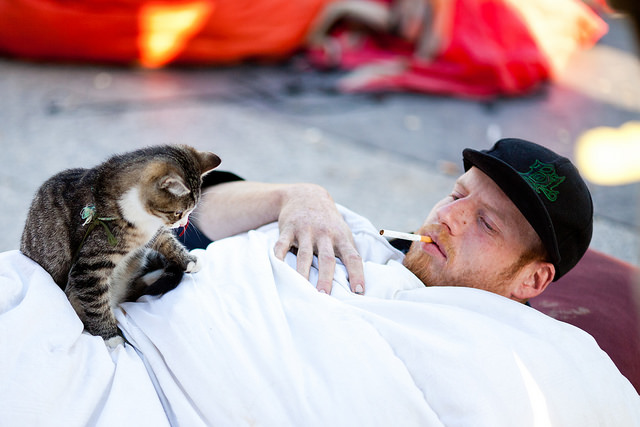We’re all likely aware of the dangers of smoking cigarettes. There are countless controversial advertisements and warnings and people and organizations arguing back and forth about just how unhealthy smoking is. But the focus is solely on humans. Yes, humans are the ones doing the smoking, but you’ve likely heard about how second- and third-hand smoke harms children and other non-smokers being exposed. This also stands true for our pets. While we’re not here to discuss whether you should or shouldn’t smoke cigarettes, we are dedicated to the health and well-being of pets all over the world and want to share the important dangers of second-and third-hand smoke.

#1 – Respiratory Infections
Cats exposed to second- and third-hand cigarette smoke are at an increased risk of developing respiratory infections. Just like with humans, cigarette smoke deposits the same chemicals and toxins into your cat’s respiratory tract. Exposure to second- and third-hand smoke can cause and exacerbate conditions like bronchitis and asthma. Cats may have a difficult time overcoming these ailments because of their continued exposure. According to veterinarian Dr. Karen Becker, “Animals with asthma or bronchitis may have difficulties controlling their disease. A lot of vets, even though not much literature is published to prove that, would tell you that they have seen similar experiences. The owner quit smoking and the pet’s lung problems or disease improved.” With respiratory ailments, cats are at a higher risk for other issues as well. Chronic lung damage can occur and left untreated can greatly decrease your cat’s quality of life.

#2 – Cancers
Perhaps the major reason smoking is frowned upon is the increased risk of cancer. But this risk doesn’t only apply to humans. In fact, second- and third-hand smoke puts our cats at a higher risk for several different types of cancers. Cigarette smoke settles on your cat’s fur and since our cats groom themselves so regularly, the ingestion of the toxins on their coats increases their risk of tracheal carcinoma. Oral cancers are not commonly found in cats from non-smoking homes, but in smoking homes the rates are actually quite high. Veterinary Medicine published a study that concluded cats exposed to cigarettes daily are four times more likely to develop oral cancers. The rate of malignant lymphoma is high as well. A study published in the American Journal of Epidemiology found that cats living in homes where someone smokes a pack of cigarettes or more per day are three times more likely to develop malignant lymphoma than cats living with nonsmokers.

